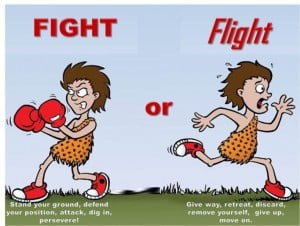Attachment and Violent Anger Part II: 4 Dangerous Ways to Express Our Anger
In Attachment and Violent Anger Part I, I talked about how attachment with caregivers in our early-years causes us to form either a positive trusting view of our selves and others or a view that is negative and mistrustful.
Loss of attachment is critically dangerous to human beings.
When people trapped in the World Trade Center were confronted with a life-threatening event, most of them attempted to call their most significant attachment to tell them that they loved them.
In everyday life, any perceived threat to our closest relationships puts our sense of security at risk.
This triggers a part of our brain, the amygdala, to set off a primal fear response. This fear is designed to propel us into action. It is the DEFCON 5 warning signal that tells us that our destruction is near and we better do something about it. Our physiology ramps up for action to either fight the danger or flee from it.
This fight-or-flee reaction makes a whole lot of sense if we are being attacked by a bear or are a soldier in battle. However, with the people we love most, it tends to get us into more trouble than it 
Moments earlier he or she was your “honey bunch”, your “dear one”, afraid of losing connection with you. And now, your self-protective reactions will create great insecurity in your lover and cycles of conflict between the two of you that will be difficult to escape.
Anger in intimate relationships is a normal part of life together.
It’s a no-brainer that we get most angry when we are afraid of losing the one person who we love the most.
The point here is that we are most threatened when we sense that a disagreement with the person we love could compromise the relationship. We want to fight to make it right or avoid the fight altogether to protect the relationship.
Seattle researcher John Gottman discovered that arguments themselves could not separate couples who were headed to divorce from couples who would spend a relatively happy lifetime together.
What Gottman found was that the way couples fought had everything to do with whether they were eventually headed for divorce court. Gottman calls these destructive forms of anger the “four horsemen of the apocalypse.”
How do you fight when you get afraid?
Gottman’s 4 Horsemen:
- Criticism: By attacking your partner’s personality or character, often with the intent of making someone right and someone wrong: Words are often used like: “you always…” “you never…”, or “you’re the type of person who …”.
- Contempt: Attacking your partner’s sense of self with the intent to insult or psychologically abuse him/her. –Examples include Insults and name-calling: “wimp, fat, stupid, ugly, slob, lazy…”; Using hostile humor, sarcasm or mockery; Body language & tone of voice: rolling your eyes, sneering, curling your upper lip
- Defensiveness: Seeing self as the victim, warding off a perceived attack: – Examples include making excuses like “It’s not my fault…”, “I didn’t…”or meeting your partner’s complaint, or criticism with a complaint of your own, not acknowledging what your partner said
- Stonewalling: Withdrawing from the relationship as a way to avoid conflict. Partners may think they are trying to be “neutral” but stonewalling conveys disapproval, icy distance, separation, disconnection, and/or smugness: – Stony silence – Changing the subject – Removing yourself physically – Showing no emotion.
Using anger in any of these ways destroys, rather than resolves, trust issues in relationships.
Gottman found that contempt and stonewalling were especially predictive of relationship demise.
Men have a particular vulnerability to stonewall or withdraw when they feel threatened in love relationships.
Silent anger, giving your partner no feedback, will do more to throw your lover off balance and destabilize her than anything else. Men often begin this maneuver with the noble motive of not wanting to make the conflict worse. This behavior has darker motives when there is deep distrust in the partner’s desire to be loving (negative view of other) or fear that we we are unlovable (negative view of self).
We are unable to change our negative view of our selves or others until we experience being loved when we are afraid of losing the relationship. We never forget fear-based emotional memory. It has to be replaced by a new experience of safety.
Using the four horses to express your anger will only drive your partner further away and not give you the vital experience of being held close when you are most afraid.
In Part III of Attachment and Anger I will talk more about proven methods that can help you convert your anger into a stronger, more loving relationship with your lover and with yourself.
The Four Horsemen of the Apocalypse: Based on John Gottman’s Relationship Research Adapted from his book “The Seven Principles for Making a Marriage Work”
Ecker, B. and Ticic, R., Unlocking the Emotional Brain: Eliminating Symptoms at Their Roots Using Memory Reconsolidation




